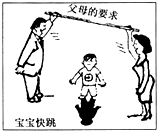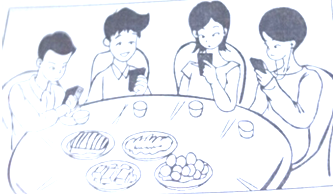2.Every year more people recognize that it is wrong to kill wildlife for"sport".Progress in this direction is (50)Cbecause shooting is not a sport for watching,and only those few who take part realize the cruelty and (51)B.
The number of gunners,however,grows rapidly.Children too young to develop proper judgments through (52)Bthought are led along way away by their gunning parents.They(53)Aadvertisements of gun producers who describe shooting as good for their health and gun-carrying as a way of putting redder blood in the veins (血管).They are persuaded by gunner magazines with stories (54)Cthe chase and the kill.In school they view motion pictures which are (55)Bmeant to teach them how to deal with arms safely and which are actually designed to (56)Da desire to own a gun.Wildlife is disappearing because of shooting and because of the loss of wildland habitat.Habitat loss will continue with our increasing population,but can we slow the loss of wildlife caused by (57)B?There doesn't seem to be any chance if the serious condition of our birds is not improved.
Wildlife belongs to everyone and not to the gunners alone.Although most people do not shoot,they seem to (58)Ashooting for sport because they know little or nothing about it.The only answer,then,is to bring the (59)Dabout sport shooting to the great majority of people.
Now,it is time to realize that animals have the same (60)Cto life as we do and that there is nothing (61)Bor right about a person with a gun shooting the harmless and beautiful (62)D.The gunners like to describe what they do as character-building,but we know that to wound an animal and watch it (63)Cthe pain of dying can make nobody happy.If they would have you believe,gun-carrying and killing improve human-character,perhaps we should (64)Dwar.
The number of gunners,however,grows rapidly.Children too young to develop proper judgments through (52)Bthought are led along way away by their gunning parents.They(53)Aadvertisements of gun producers who describe shooting as good for their health and gun-carrying as a way of putting redder blood in the veins (血管).They are persuaded by gunner magazines with stories (54)Cthe chase and the kill.In school they view motion pictures which are (55)Bmeant to teach them how to deal with arms safely and which are actually designed to (56)Da desire to own a gun.Wildlife is disappearing because of shooting and because of the loss of wildland habitat.Habitat loss will continue with our increasing population,but can we slow the loss of wildlife caused by (57)B?There doesn't seem to be any chance if the serious condition of our birds is not improved.
Wildlife belongs to everyone and not to the gunners alone.Although most people do not shoot,they seem to (58)Ashooting for sport because they know little or nothing about it.The only answer,then,is to bring the (59)Dabout sport shooting to the great majority of people.
Now,it is time to realize that animals have the same (60)Cto life as we do and that there is nothing (61)Bor right about a person with a gun shooting the harmless and beautiful (62)D.The gunners like to describe what they do as character-building,but we know that to wound an animal and watch it (63)Cthe pain of dying can make nobody happy.If they would have you believe,gun-carrying and killing improve human-character,perhaps we should (64)Dwar.
| 50.A.rapid | B.frightening | C.slow | D.great |
| 51.A.attraction | B.violence | C.prospect | D.motion |
| 52.A.deep | B.independent | C.subconscious | D.emotional |
| 53.A.are subjected to | B.are obliged to | C.are adapted to | D.are reduced to |
| 54.A.criticizing | B.approving | C.honoring | D.admitting |
| 55.A.deliberately | B.supposedly | C.necessarily | D.eventually |
| 56.A.publicize | B.withdraw | C.increase | D.stimulate |
| 57.A.polluting | B.shooting | C.infecting | D.feeding |
| 58.A.forgive | B.consider | C.replace | D.exchange |
| 59.A.result | B.meaning | C.background | D.truth |
| 60.A.taste | B.experience | C.right | D.problem |
| 61.A.considerate | B.fair | C.delicate | D.beneficial |
| 62.A.beast | B.rabbits | C.targets | D.creatures |
| 63.A.get over | B.drop out | C.go through | D.turn away |
| 64.A.discourage | B.agree | C.eliminate | D.encourage |
9. __ unemployment and crime are high,it can be assumed that the latter is due to the former.( )
| A. | Before | B. | Where | C. | Unless | D. | Until |
6.Thank you for your MP4player.I'll get Mary to take it to you soon.
___________.I've bought a new one.( )
___________.I've bought a new one.( )
| A. | No sense | B. | No hurry | C. | No way | D. | No use |
4.Usually John would be late for meetings.But this time, to my surprise,he arrived on time.( )
0 139222 139230 139236 139240 139246 139248 139252 139258 139260 139266 139272 139276 139278 139282 139288 139290 139296 139300 139302 139306 139308 139312 139314 139316 139317 139318 139320 139321 139322 139324 139326 139330 139332 139336 139338 139342 139348 139350 139356 139360 139362 139366 139372 139378 139380 139386 139390 139392 139398 139402 139408 139416 151629
| A. | little | B. | much | C. | ever | D. | even |
 请根据图片,写一篇短文,内容包括:
请根据图片,写一篇短文,内容包括: